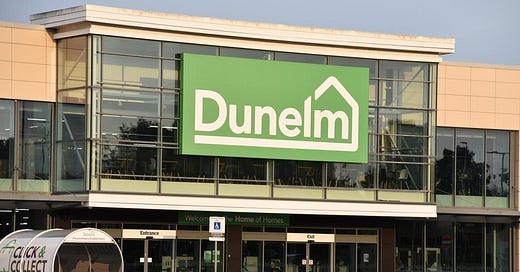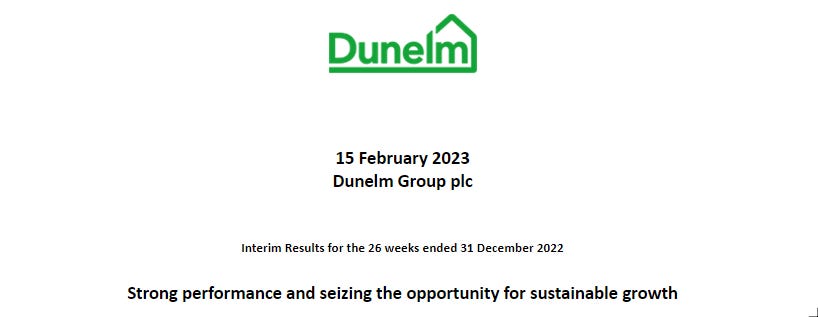Mixed messages
I woke up on the 15th of February to three headlines which really got me thinking.
The first was this tweet, from the retailers’ journal of record, Retail Week. Bad news indeed, I thought, if as well-run and well-liked a retailer as Dunelm is having as tough a time as that. I know journalists love an opportunity to use ‘plummet’ but it’s never a word you want in a headline about your business.
Turning to my emails, though, I then found this headline from the excellent retail analyst team at one of the big brokers who are kind enough to include me on their mailing list:
Hang on then, something isn’t right here. Are they doing well or badly? My management consulting training, several centuries ago, drummed into me the importance of going to the source, so let’s get some clarity by looking at that morning’s RNS (regulatory news service announcement, the official source of a PLC’s results releases).
And that gets us this headline from the company itself - generally positive but arguably just a little bit less so than the broker one (‘seizing the opportunity’ being one of those slightly vague catch-all headlines that covers a multitude of sins).
Expectations vs Reality
So where does all of that get us? It gets us to the expectations game. The actual fact of Dunelm’s H1 results is that they included revenues slightly higher but profits slightly lower than the same period in the prior year.
Now there are several reasons why that might be the case - the prior period certainly still included some of the post-lockdown mini-boom that many retailers experienced, creating tougher comparatives. All else being equal, then, you might expect revenues to have fallen, but for them to have grown instead might suggest some investment in pricing (and therefore gross margins) to chase that business.
Either way, when you get to the really important measures free cash flow was almost unchanged on the prior period (and in any case was £102m, a figure any retailer of Dunelm’s size would be happy with, I think). Capital expenditure on the estate continued and the business paid out a thumping great additional dividend to shareholders - all in all, not a bad 6 months work.
If the conclusion is “profits down but not as much as they might have been”, that is further evidenced by the share price, which was broadly flat but slightly up on the day.
The game we all play
Most of us, though, don’t run PLCs and don’t have to play the game of managing City analyst expectations. So what does my Wednesday morning journey through Dunelm’s results mean for us?
It seems to me that the wider issue of expectations versus actual results turns up a lot in business life.
“We said the project would take 12 months and we delivered it in 11”
“We set a really conservative budget for sales this quarter and have beaten it”
“I said my costs would be £700k this year and I came in at £680k”
All of these sound great, and they are the cornerstones of performance management conversations in businesses up and down the country.
But for every comparison to expectations, there is another and altogether less forgiving comparison to be made too.
“It’s great that you did the project in 11 months, but our competitor did it in 6 and beat us to market”
“Your conservative sales budget wasn’t enough to generate the revenues to offset inflationary cost increases and we’ve gone bust”
“Your close management of costs is great, but we should have been spending that money on something more valuable”
The tougher comparisons are external, and are with reality rather than expectations. Did you gain market share. Does your return on investment represent a good use of your investors’ money (compared to what else they could have invested in)?
In fact, we might argue that the only expectations that actually matter are your customers’ - exceed those reliably and positive things will surely follow.
Faced with this tougher reality check, the middle ground adopted by the Dunelm RNS feels about right to me. Beating expectations isn’t really enough (though it keeps the share price happy for the day). But they did more than that, delivering a solid, cash generative and competitively attractive set of results and that is what really matters.
P.S.
Regular readers will remember this post on Christmas trading, and will note Dunelm’s strong top half of the table performance on “LFL” sales. Last week’s H1 announcements are a clear reminder, I think, of the point in this post that it is well worth waiting for audited numbers including profit and cash generation before celebrating (or commiserating) Christmas performance!









Love the articles, thanks Ian!
The insights you provided on expectations Vs Reality made me chuckle.